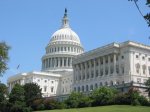Congress Passes Stopgap Funding, Debt Ceiling Extension, and Disaster Aid

On September 8, President Donald Trump signed a legislative package including provisions to provide more than $15 billion in disaster recovery aid, raise the debt ceiling, and enact a continuing resolution to fund federal programs after the September 30 end of this fiscal year until December 8, 2017. The president’s signature came after House lawmakers cleared the bill (HR 601) by a 316-90 vote earlier in the day. The Senate approved the package the day before by a 80-17 vote.
The legislative package clears Congress’ September calendar of several battles that were expected to occur over appropriations, the debt limit, and the future of the National Flood Insurance Program (NFIP). Trump, who endorsed the package earlier in the week, urged members of Congress to now use September to work on tax reform.
The continuing resolution (CR) included in HR 601 funds the federal government until December 8, eliminating the threat of a federal government shutdown when the new fiscal year begins on October 1. The CR funds programs at Fiscal Year (FY) 2017 levels, with a small 0.68 percent across-the-board reduction to discretionary spending programs to stay within the caps set by the Budget Control Act (BCA) of 2011. The measure also includes language to extend, for the duration of the CR, HUD’s Mark-to-Market Program. The Administration requested this extension, as it estimates up to 19 project-based rental assistance properties with approximately 3,000 assisted units will be eligible for Mark-to-Market restructuring in the first quarter of FY 2018, which, without access to the program, could face financial distress.
Congress now has three months to find a longer-term solution for FY 2018 appropriations, which could include enacting full-year appropriations bills separately or in one or more omnibus spending bills, working on a bipartisan budget agreement to provide temporary relief from BCA caps, or opting for another continuing resolution. The House began debate on an FY 2018 omnibus package last week but has postponed further consideration until this week. NCSHA will report on that legislation after the House completes action.
HR 601 provides $15.3 billion in emergency disaster funding—an initial installment of aid to respond to the damage caused by Hurricane Harvey and expected from Hurricane Irma. This includes $7.4 billion for HUD’s Community Development Block Grant Disaster Recovery (CDBG-DR) program, $7.4 billion for the Federal Emergency Management Agency, and $450 million for the Small Business Administration’s disaster loan program. Congress sought quick action to approve these supplemental funds after FEMA announced it could exhaust its existing disaster relief funds in just days.
HR 601 also extends the NFIP until December 8 which would otherwise expire on September 30. Lawmakers say they plan to continue negotiating a longer-term reauthorization bill with reforms to the program over the next few months.

